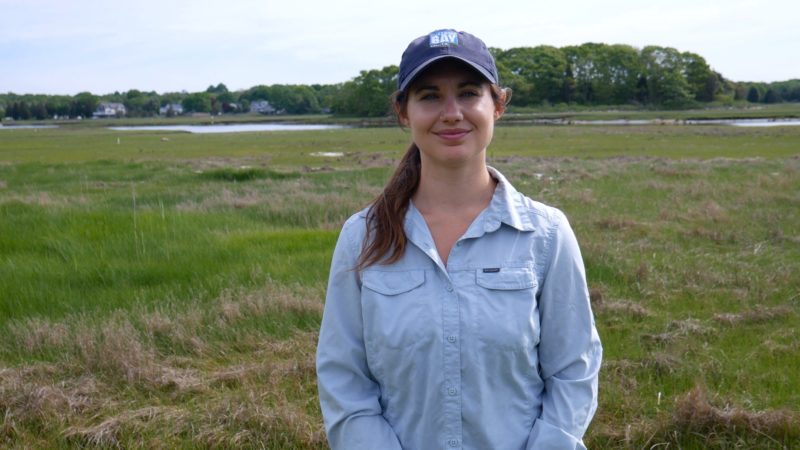Coalition scientist elected to governing board of national research association
Alice Besterman is having a good summer.
The coastal ecologist who serves as postdoctoral research fellow at the Coalition and Woodwell Climate Research Center began the season collecting the first round of data from a three-year study of a restoration technique for declining salt marshes on Buzzards Bay and beyond.
 And in late July, she was elected to the Governing Board of the Coastal and Estuarine Research Federation (CERF), an organization with more than 1,700 members engaged in the study, management, and stewardship of coastal environments. Founded in 1971, it promotes research into coastal ecology and facilitates ongoing dialogue among scientists, policymakers and the public. Besterman will serve a two-year term as the organization’s secretary of the Board.
And in late July, she was elected to the Governing Board of the Coastal and Estuarine Research Federation (CERF), an organization with more than 1,700 members engaged in the study, management, and stewardship of coastal environments. Founded in 1971, it promotes research into coastal ecology and facilitates ongoing dialogue among scientists, policymakers and the public. Besterman will serve a two-year term as the organization’s secretary of the Board.
“I’m thrilled to have this opportunity. CERF brings together fundamental and applied science to add to our knowledge about how coastal and estuarine ecosystems function and how they can best be managed,” Besterman said. “It’s very much in keeping with the way that the Coalition approaches its mission to protect Buzzards Bay, basing its efforts on scientific data.”
Besterman is leading the Coalition’s effort to test runnelling, a process in which shallow channels are dug in a saltmarsh to aid the natural tidal flow and drain impounded water that would otherwise kill marsh vegetation. The multi-year effort, which involves marshes in Dartmouth and Fairhaven, should provide insights into whether and how this adaptation technique can be used in other salt marshes threatened by climate change and human activity.
Mark Rasmussen, president of the Coalition, said that Besterman is an outstanding choice to serve on the CERF governing board. “Alice not only brings a great deal of energy and insight to our work, but also a great collaborative style that has strengthened our partnerships with other nonprofits and with local municipalities,” he said. “Her election to the Board speaks to her growing reputation and visibility in the coastal research community.”
In the past year, Besterman has presented information about the Coalition’s salt marsh restoration project at professional conferences, including those held by CERF. In fact, the group’s most recent regional conference also included a presentation on the project by Northeastern student Melissa Herring, who served as an intern for the effort last year and is now continuing on in a data management role with grant support from the National Science Foundation.
Creating more opportunities for students to gain experience in environmental science is of great interest to Besterman. During her term on the organization’s governing board, she hopes to focus on programs that promote diversity and equity in the field. “Right now, there is a real lack of access to internship opportunities for folks who don’t have the family resources to work for free as an intern or volunteer,” she said. “An organization like CERF can raise more funds to develop scholarships for student internships, and that’s what I hope to be involved in while I’m on the governing board.”